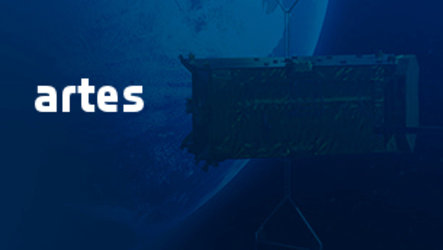New electric propulsion module bids Belfast farewell
It is nearly time for the first new electric propulsion module of Spacebus Neo to complete its last run of tests in Thales UK’s Belfast assembly centre before being shipped to Cannes for final spacecraft assembly.
Spacebus Neo is a new telecom satellite product line by Thales Alenia Space, developed under ESA’s Neosat programme.
The first satellite will be Eutelsat’s KONNECT, which will provide broadband to Europe and Africa.
A balancing act of innovation
Electric propulsion is one of the main pillars of the Neosat programme.
Its key advantage over traditional chemical propulsion is that it requires less propellant; requiring significantly less mass and consequently less volume on board the satellite.
This gives the satellite owner the option to either have the same payload and benefit from the lower mass of the spacecraft, resulting in a lower cost to launch, or to significantly increase the size of the payload to take advantage of the launcher capability.
The Spacebus Neo design is also innovative, incorporating electric propulsion from the start.
All of the propulsion equipment is either installed inside of, or attached to, a central tube to become a standalone module, further contributing to the mission’s efficient use of space.
The spacecraft is designed to be as quick and cost-effective to build as possible, being based on a modular concept, while also being easily customisable to fit the satellite’s owner’s mission.
This is crucial in an industry that always treads a tightrope between payload mass, power, schedule and overall cost.
A pioneering module

As the first of its kind, the Spacebus Neo electric flight propulsion hardware's performance is being rigorously tested in Belfast to establish that it is behaving as it should, and prove that the standardised design is robust enough to support the wide range of missions for which it is intended.
The electric propulsion model is racking up ‘firsts’ in other areas as well, as the first of its kind to be a wholly UK product, designed by Thales Alenia Space in the UK, and tested and assembled in Thales Belfast.
It is now being prepared for shipment to Thales Alenia Space Cannes in France, where it will be mated with the avionics and payload modules and subject to extensive mechanical, thermal and functional tests to ensure that it will be able to cope with the harsh conditions of launch and space.
The satellite will be launched from French Guyana next year on an Ariane 5, and will travel to its final orbital slot on the geostationary arc over the course of six months.
When operational, the satellite will connect developing communities that have not previously had reliable access to broadband services, if at all.
It is designed to provide flexible, affordable coverage to equipped businesses and homes, in Europe and Africa.
Brought about by partnership
UK Space Agency Chief Executive, Graham Turnock, said: “Pioneering innovations like this all electric propulsion module will improve access to space, but also deliver new jobs and growth on the ground. We’re working with industry to grow the UK’s share of the global space market to 10% by 2030, and the Thales Alenia Space facility in Belfast is an excellent example of that capability.”
ESA Director of Telecommunications and Integrated Applications, Magali Vaissiere, said: “We are proud to celebrate this milestone with our partners. Supporting the competitiveness of our Member States’ industry is of paramount importance to ESA, and the Spacebus Neo programme is a prime example of a successful ARTES public-private partnership, with a satellite system integrator managing a large scale innovative project and its in-orbit validation.”
Thales Alenia Space UK CEO, Ben Olivier, said: “The all-electric propulsion module, designed and built by specialist teams in Harwell and Belfast, represents the strong commitment of Thales Alenia Space to create, sustain and grow world class innovation, design and advanced space engineering skills in the UK, producing important contributions to future space programmes. This event is an important delivery milestone not only for Eutelsat, Thales Alenia Space and Thales but also for our stakeholders in Invest Northern Ireland, the UK Space Agency and the European Space Agency. This important step is a reflection of the UK’s dynamic and growing space sector. The UK space industry is a key pillar in the Government’s Industrial Strategy for economic growth in the UK and the delivery of this module is a tangible example of the progress of that strategy and represents a significant investment in the UK by Thales Alenia Space.”

Eutelsat’s Deputy CEO and Chief Technical Officer, Yohann Leroy, said: “Championing innovation in the space industry, we are proud to welcome the delivery of the Spacebus Neo XPS module to our future KONNECT satellite, which will reinforce our leadership in the use of electric propulsion for geostationary communication satellites. This collaboration with Thales Alena Space is of significant importance to us. It marks the first of a two-part series, with two satellites in construction by Thales Alenia Space for Eutelsat: KONNECT and KONNECT VHTS. This ground-breaking industrial approach for the XPS modules, spearheaded by UK space industry, will be rolled-out to both programmes.”
The Neosat programme
The new Spacebus Neo product line is developed in the frame of ESA's Advanced Research in Telecommunications Systems (ARTES) programme, in cooperation with space agencies from ESA Member States, particularly CNES and the UK Space Agency.
The Neosat programme comprises both Spacebus Neo by Thales Alenia Space and Eurostar Neo by Airbus Defence and Space. It includes development and in-orbit validation of the new satellite product lines for both companies, allowing the two European satellite prime integrators to deliver competitive satellites for the commercial satellite market.















 Germany
Germany
 Austria
Austria
 Belgium
Belgium
 Denmark
Denmark
 Spain
Spain
 Estonia
Estonia
 Finland
Finland
 France
France
 Greece
Greece
 Hungary
Hungary
 Ireland
Ireland
 Italy
Italy
 Luxembourg
Luxembourg
 Norway
Norway
 The Netherlands
The Netherlands
 Poland
Poland
 Portugal
Portugal
 Czechia
Czechia
 Romania
Romania
 United Kingdom
United Kingdom
 Slovenia
Slovenia
 Sweden
Sweden
 Switzerland
Switzerland


























